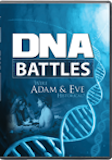Three Genetic Groupings
Washington Post: “Among Many Peoples, Little Genomic Variety” A new genetic study of 53 human populations shows that each falls into one of three genetic groups—yet that the three groups aren’t as different as was thought. The legacy of Shem, Ham, and Japheth (Noah’s three sons), perhaps?
Washington Post writer David Brown reviews a recent study that analyzes genetic information from 53 human groups, comparing and contrasting what makes us human.
Generally speaking, all people groups seem to fall into “just three” categories, Brown reports.
Generally speaking, all people groups seem to fall into “just three” categories, Brown reports. According to evolutionists, this tripartite division originated when humans left Africa tens of thousands of years ago, splitting into African, Eurasian, and East Asian groups (the third of which includes Pacific Islander and Native American groups).
For creationists, that division makes plain sense as reflective of the people groups that split off after Babel, all descendants of Shem, Ham, and Japheth. Of course, in the millennia since, those people groups have migrated and interbred, so it’s difficult to say perfectly what modern groups belong to what ancestor—or even to imply that the ordinary human descends from just one of Noah’s three sons/daughters-in-law. Additionally, the genomes have been influenced over the years by environment. So a population of Shem’s descendants and a population of Japheth’s descendants living in the same environment for millennia would come to resemble one another. Brown makes the point, albeit from an evolutionary perspective:
People adapted to what they encountered the way all living organisms do: through natural selection. A small fraction of the mutations constantly creeping into our genes happened by chance to prove beneficial in the new circumstances outside the African homeland. Those included differences in climate, altitude, latitude, food availability, parasites, infectious diseases, and lots of other things.
Nonetheless, the study is an exciting reminder of the reality of the Genesis account.
But what else is interesting is that the three broad groupings in the study aren’t as different as evolutionists expected. Brown writes, “Scientists have long known that regardless of ancestral home or ethnic group, everyone’s genes are pretty much alike. We’re all Homo sapiens. Everything else is pretty much details.” Brown identifies skin color as the “most obvious” of these details. Of course, that reflects what creationists have emphasized, but differs from what some evolutionists originally preached (see Darwin’s Plantation for more). He goes on, “Population geneticists expected to find dramatic differences . . . [but] that’s not what scientists have found. Dramatic genome variation among populations turns out to be extremely rare.”
The entire study reminds us of how the variation we see among human populations today could have arisen as our forbears left Babel. Genetic drift and natural selection played important roles over time, which is why any two humans randomly selected may differ in stature, skin color, disease susceptibility, lactose tolerance, and so forth—even while all of us remain entirely and equally human. The Bible’s message in Acts 17:26—that we are all of one blood, descendants of Adam through Noah—is a powerful truth explaining our world.
For more information:
Remember, if you see a news story that might merit some attention, let us know about it! (Note: if the story originates from the Associated Press, Fox News, MSNBC, the New York Times, or another major national media outlet, we will most likely have already heard about it.) And thanks to all of our readers who have submitted great news tips to us.
(Please note that links will take you directly to the source. Answers in Genesis is not responsible for content on the websites to which we refer. For more information, please see our Privacy Policy.)
Recommended Resources

Answers in Genesis is an apologetics ministry, dedicated to helping Christians defend their faith and proclaim the good news of Jesus Christ.
- Customer Service 800.778.3390
- Available Monday–Friday | 9 AM–5 PM ET
- © 2026 Answers in Genesis




